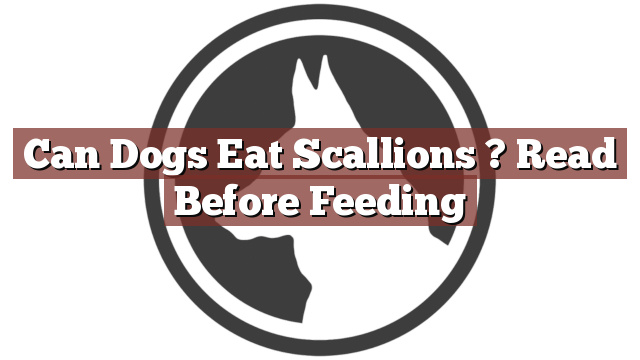Understanding Your Dog’s Dietary Needs
As responsible pet owners, it is crucial to understand and meet our dogs’ dietary needs. Providing our furry friends with a balanced and nutritious diet is vital for their overall health and well-being. While dogs are primarily carnivorous animals, they can also benefit from certain fruits and vegetables that are safe for consumption. However, it is essential to be cautious and informed about which human foods are suitable for dogs and which can be potentially harmful.
Can Dogs Eat Scallions? Read Before Feeding
Can dogs eat scallions? The short and straightforward answer is no. Scallions, also known as green onions, belong to the Allium family, which includes plants like onions, garlic, and leeks. While scallions may seem harmless to us, they can pose a significant risk to our canine companions. Scallions contain a compound called thiosulfate, which can cause oxidative damage to a dog’s red blood cells, leading to a condition called Heinz body anemia.
Pros and Cons of Feeding Scallions to Dogs
Feeding scallions to dogs can have serious consequences. Ingesting even a small amount of scallions can result in symptoms like vomiting, diarrhea, stomach pain, weakness, and pale gums. In severe cases, it can lead to organ damage and even death. It is important to note that the size, age, and overall health of your dog can also play a role in how they react to scallions. However, it is always best to err on the side of caution and avoid feeding scallions to your furry friend altogether.
On the other hand, there are several safe and nutritious options that you can include in your dog’s diet to provide them with a variety of flavors and nutrients. Consult with your veterinarian to determine the best fruits and vegetables that are suitable for your individual dog, taking into consideration any specific dietary restrictions or health conditions they may have.
In Conclusion: Scallions, a Potential Risk to Dogs’ Health
In conclusion, it is crucial to be aware of which human foods are safe for our dogs to eat. While scallions may be a common ingredient in many dishes, they should never be fed to dogs. The compound present in scallions can have severe consequences on their health, potentially leading to anemia and organ damage. As responsible pet owners, it is our duty to prioritize the well-being of our furry companions and provide them with a diet that meets their specific nutritional needs. Always consult with a veterinarian before introducing any new food into your dog’s diet to ensure their safety and overall health.
Thank you for taking the time to read through our exploration of [page_title]. As every dog lover knows, our furry friends have unique dietary needs and responses, often varying from one canine to another. This is why it's paramount to approach any changes in their diet with caution and knowledge.
Before introducing any new treats or making alterations to your dog's diet based on our insights, it's crucial to consult with a veterinarian about [page_title]. Their expertise ensures that the choices you make are well-suited to your particular pet's health and well-being.
Even seemingly harmless foods can sometimes lead to allergic reactions or digestive issues, which is why monitoring your dog after introducing any new food item is essential.
The content provided here on [page_title] is crafted with care, thorough research, and a genuine love for dogs. Nevertheless, it serves as a general guideline and should not be considered a substitute for professional veterinary advice.
Always prioritize the expert insights of your veterinarian, and remember that the health and happiness of your furry companion come first.
May your journey with your pet continue to be filled with joy, love, and safe culinary adventures. Happy reading, and even happier snacking for your canine friend!

